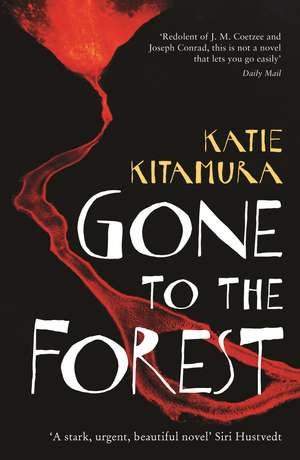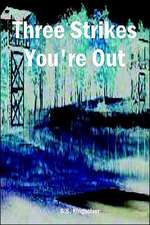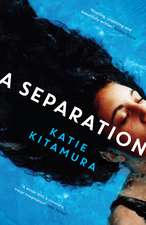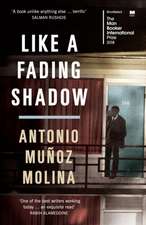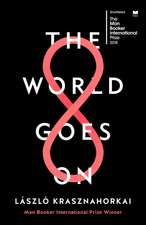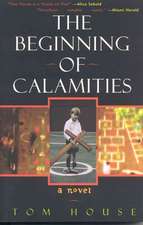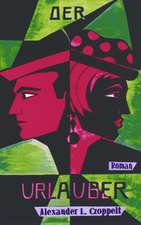Gone to the Forest
Autor Katie Kitamuraen Limba Engleză Paperback – 19 feb 2014
Preț: 47.01 lei
Preț vechi: 56.61 lei
-17% Nou
Puncte Express: 71
Preț estimativ în valută:
8.100€ • 9.39$ • 7.44£
8.100€ • 9.39$ • 7.44£
Carte disponibilă
Livrare economică 14-28 martie
Livrare express 28 februarie-06 martie pentru 25.76 lei
Preluare comenzi: 021 569.72.76
Specificații
ISBN-13: 9781846689246
ISBN-10: 1846689244
Pagini: 208
Dimensiuni: 128 x 196 x 16 mm
Greutate: 0.15 kg
Ediția:Main
Editura: Profile
Colecția Clerkenwell Press
Locul publicării:London, United Kingdom
ISBN-10: 1846689244
Pagini: 208
Dimensiuni: 128 x 196 x 16 mm
Greutate: 0.15 kg
Ediția:Main
Editura: Profile
Colecția Clerkenwell Press
Locul publicării:London, United Kingdom
Notă biografică
Katie Kitamura is based in New York and London. She has written for numerous publications, including The New York Times, Wired and the Guardian. She was a finalist in the 2010 New York Public Library Young Lions Fiction Award for her debut novel, The Longshot.
Recenzii
The death-throes of a colonial world captured in dark, obsessive prose, punctuated by images of strange, surreal beauty. One thinks at times of both Coetzee and Gordimer, but Kitamura is very much her own writer
Beautifully observed ... the cumulative effect of this shocking, desperate book is something that approaches magnificent
Kitamura is in complete control, both of the prose and of the story it carries. She is a skilled hunter and we are her helpless prey
A stark, urgent, beautiful novel. The characters and images continue to haunt me, a tribute to their lasting emotional power and their creator's extraordinary gifts
A ruthless, controlled style distinguishes this novel ... [Kitamura's] style reminds one of Marguerite Duras and Herta Müller - power is the subject, and the execution is precise
A mesmerizing novel, one whose force builds inexorably as its story unfolds in daring, unexpected strokes. Kitamura's prose brings to mind Cormac McCarthy or Jean Rhys, but the music of these lines is all her own - lyrical, sharp-edged, spare, and unafraid. Be warned: you'll find yourself reading long past midnight, out of breath and wide awake. This is a bold and powerful book.
I have been in a daze ever since I finished this book. Gone to the Forest is superb. It is so beautifully written, so balanced - there isn't a spare sentence or word in the whole thing ... Utterly distinctive. Kitamura is one of the best living writers I've read, and she gives the dead ones a run for their money.
Hemingway's returned to life - and this time, he's a woman
A relentless fever dream, each perfectly pared paragraph urging you on to the next
There is nothing better on earth, fictive or not, than What Goes Wrong on the Plantation, and in Gone to the Forest it goes totally and splendidly wrong.
Evokes a Conradian Heart of Darkness portentousness . . . flashes of unexpected beauty . . . Like the intricate ingenuity of the floating farm flush with the golden fish, Gone to the Forest, in just 200 pages, floats, unfolds and astonishes.
In a restrained voice Ms. Kitamura offers echoes of J. M. Coetzee's Disgrace, coolly chronicling the family's undoing as it tracks against the political turmoil ripping through the nation.
Gone to the Forest is Katie Kitamura's second novel, about a family and the cost of European colonization in an unknown time and place... that recalls, at first and most often, J.M. Coetzee's South Africa. Kitamura writes with fine tension and clipped grace. Her observations are subtle and sharp. The volcano's importance in the story evokes Aime Cesaire's poem Corps Perdu, which begins, "Moi, qui Krakatoa . . ." and is a soaring command, in the wake of decolonization, for "the islands to be." [She is a] rising literary star.
Striking . . . Beautifully written . . . Kitamura's carefully wrought characters are captivating.
In this wondrous tale of both a family and a country's dissolution, Kitamura brings readers into an unspecified time in an unnamed colonial country . . . Kitamura, with spare, mesmerizing prose, paints a memorable vision of emotional chaos echoed by geologic and political turmoil.[Starred review]
Kitamura's words are tough, and her characters are tied to the tails of wounded beasts: mother countries, the land itself, and hierarchies both out of steam and out of date . . . Kitamura makes the end of history - many histories - seem both casual and immediate.
A rising literary star ... Gone to the Forest is darkly seductive'
Rendered in a stripped-back eerily simple prose... reads like Hemingway or Cormac McCarthy... It's horrible and beautiful and pretty much a class act all round
Redolent of J.M. Coetzee and Joseph Conrad, this is not a novel that lets you go easily, even after you reach the end.
Beautifully written, with the pace of a thriller, this is a dark, twisted gem
Haunting and hypnotic... stunningly wrought... an intelligent, unforgettable novel
There is much to admire in this ambitious piece of fiction
A stunningly dark story
Wonderfully evocative... by the end I was hooked and harrowed in equal measure. Gone to the Forest starts off very quietly but delivers a cracking great wallop at the end.
Thirty-three-year-old Katie Kitamura writes about raging, ageing men better than most raging, ageing men do themselves... Gone to the Forest is bold for many reasons: not only for the cultural, sexual, historical and national boundaries that Kitamura steps over to get into the minds of her characters. But also for the way she explores the cruelty of colonisation - whether it's of homelands, or of women's bodies - within a hauntingly beautiful, startlingly brief story of an old man dying.
Written in stripped-down prose, the whole has a mythic resonance that leaves a deep impression in the mind... in Gone to the Forest: as the rebels rise and a volcano explodes, Kitamura is dedicated to giving us a thrilling snapshot of tensions boiling over, and of "the world, falling to pieces".
A pressure cooker of a book ... An allegorical novel of almost unnerving starkness
A novel of Steinbeckian characters living in a land of Biblical harshness described with a contemporary fast-and-looseness at a dizzying pace ... Otherworldly ... Strange, seductive, transporting.
When a nearby volcano erupts, so do filial, sexual and political tensions, which Kitamura relates in cool, clipped reportage. The minimal context is frustratingly claustrophobic, but the effect is mesmerising. We discover a fable-like tale, restricted in relevance to no specific history or peoples, that condemns neither colonisers nor the colonised but rather those who fail to attempt understanding. This is sparse, dark, elegant prose that startles with its subtlety and sharp insight.
Beautifully observed ... the cumulative effect of this shocking, desperate book is something that approaches magnificent
Kitamura is in complete control, both of the prose and of the story it carries. She is a skilled hunter and we are her helpless prey
A stark, urgent, beautiful novel. The characters and images continue to haunt me, a tribute to their lasting emotional power and their creator's extraordinary gifts
A ruthless, controlled style distinguishes this novel ... [Kitamura's] style reminds one of Marguerite Duras and Herta Müller - power is the subject, and the execution is precise
A mesmerizing novel, one whose force builds inexorably as its story unfolds in daring, unexpected strokes. Kitamura's prose brings to mind Cormac McCarthy or Jean Rhys, but the music of these lines is all her own - lyrical, sharp-edged, spare, and unafraid. Be warned: you'll find yourself reading long past midnight, out of breath and wide awake. This is a bold and powerful book.
I have been in a daze ever since I finished this book. Gone to the Forest is superb. It is so beautifully written, so balanced - there isn't a spare sentence or word in the whole thing ... Utterly distinctive. Kitamura is one of the best living writers I've read, and she gives the dead ones a run for their money.
Hemingway's returned to life - and this time, he's a woman
A relentless fever dream, each perfectly pared paragraph urging you on to the next
There is nothing better on earth, fictive or not, than What Goes Wrong on the Plantation, and in Gone to the Forest it goes totally and splendidly wrong.
Evokes a Conradian Heart of Darkness portentousness . . . flashes of unexpected beauty . . . Like the intricate ingenuity of the floating farm flush with the golden fish, Gone to the Forest, in just 200 pages, floats, unfolds and astonishes.
In a restrained voice Ms. Kitamura offers echoes of J. M. Coetzee's Disgrace, coolly chronicling the family's undoing as it tracks against the political turmoil ripping through the nation.
Gone to the Forest is Katie Kitamura's second novel, about a family and the cost of European colonization in an unknown time and place... that recalls, at first and most often, J.M. Coetzee's South Africa. Kitamura writes with fine tension and clipped grace. Her observations are subtle and sharp. The volcano's importance in the story evokes Aime Cesaire's poem Corps Perdu, which begins, "Moi, qui Krakatoa . . ." and is a soaring command, in the wake of decolonization, for "the islands to be." [She is a] rising literary star.
Striking . . . Beautifully written . . . Kitamura's carefully wrought characters are captivating.
In this wondrous tale of both a family and a country's dissolution, Kitamura brings readers into an unspecified time in an unnamed colonial country . . . Kitamura, with spare, mesmerizing prose, paints a memorable vision of emotional chaos echoed by geologic and political turmoil.[Starred review]
Kitamura's words are tough, and her characters are tied to the tails of wounded beasts: mother countries, the land itself, and hierarchies both out of steam and out of date . . . Kitamura makes the end of history - many histories - seem both casual and immediate.
A rising literary star ... Gone to the Forest is darkly seductive'
Rendered in a stripped-back eerily simple prose... reads like Hemingway or Cormac McCarthy... It's horrible and beautiful and pretty much a class act all round
Redolent of J.M. Coetzee and Joseph Conrad, this is not a novel that lets you go easily, even after you reach the end.
Beautifully written, with the pace of a thriller, this is a dark, twisted gem
Haunting and hypnotic... stunningly wrought... an intelligent, unforgettable novel
There is much to admire in this ambitious piece of fiction
A stunningly dark story
Wonderfully evocative... by the end I was hooked and harrowed in equal measure. Gone to the Forest starts off very quietly but delivers a cracking great wallop at the end.
Thirty-three-year-old Katie Kitamura writes about raging, ageing men better than most raging, ageing men do themselves... Gone to the Forest is bold for many reasons: not only for the cultural, sexual, historical and national boundaries that Kitamura steps over to get into the minds of her characters. But also for the way she explores the cruelty of colonisation - whether it's of homelands, or of women's bodies - within a hauntingly beautiful, startlingly brief story of an old man dying.
Written in stripped-down prose, the whole has a mythic resonance that leaves a deep impression in the mind... in Gone to the Forest: as the rebels rise and a volcano explodes, Kitamura is dedicated to giving us a thrilling snapshot of tensions boiling over, and of "the world, falling to pieces".
A pressure cooker of a book ... An allegorical novel of almost unnerving starkness
A novel of Steinbeckian characters living in a land of Biblical harshness described with a contemporary fast-and-looseness at a dizzying pace ... Otherworldly ... Strange, seductive, transporting.
When a nearby volcano erupts, so do filial, sexual and political tensions, which Kitamura relates in cool, clipped reportage. The minimal context is frustratingly claustrophobic, but the effect is mesmerising. We discover a fable-like tale, restricted in relevance to no specific history or peoples, that condemns neither colonisers nor the colonised but rather those who fail to attempt understanding. This is sparse, dark, elegant prose that startles with its subtlety and sharp insight.
